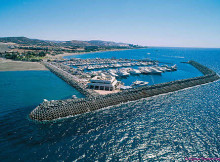Introduction
Cyprus, an island country in the Eastern Mediterranean, offers a unique blend of rich history, vibrant culture, and excellent educational opportunities. With its modern infrastructure, favorable climate, and welcoming environment, Cyprus has become an increasingly popular destination for international students seeking high-quality education and a memorable study abroad experience.
Why Study in Cyprus?
- Quality Education: Cyprus is home to several reputable universities and colleges offering internationally recognized degrees and programs.
- Multicultural Environment: Students from diverse backgrounds contribute to a rich cultural exchange and learning experience.
- Affordable Tuition Fees: Compared to other European countries, Cyprus offers relatively affordable tuition fees and living costs.
- Strategic Location: Located at the crossroads of Europe, Asia, and Africa, Cyprus provides easy access to various destinations and cultural experiences.
Top Universities
- University of Cyprus
- Cyprus University of Technology (CUT)
- University of Nicosia
- European University Cyprus
- Frederick University
Popular Courses
- Business Administration and Management
- Information Technology and Computer Science
- Engineering
- Tourism and Hospitality Management
- Medicine and Health Sciences
- Arts and Humanities
Education System
Cyprus follows the Bologna Process and offers a three-tiered higher education system comprising bachelor's, master's, and doctoral degrees. The academic year typically runs from September to June, with two semesters.
Application Process and Steps
- Research: Explore universities and programs to find the best fit for your academic and career goals.
- Entry Requirements: Check specific admission requirements for each program, including academic qualifications and language proficiency.
- Application: Submit online applications directly to universities or through authorized representatives.
- Acceptance: Upon acceptance, receive an offer letter from the university.
- Student Visa: Apply for a student visa (type D) at the Cyprus Embassy or Consulate in your home country, providing necessary documents including the offer letter, proof of funds, and health insurance.
Eligibility
- Academic Qualifications: Meet the entry requirements specified by the chosen university and program.
- Language Proficiency: Demonstrate proficiency in English or Greek through language proficiency tests like IELTS or TOEFL, if required.
- Financial Stability: Provide evidence of sufficient funds to cover tuition fees and living expenses.
- Health Insurance: Obtain health insurance coverage as required by the university and visa regulations.
Cost of Studying
- Tuition Fees: Generally range from EUR 3,000 to EUR 10,000 per year for undergraduate programs, depending on the institution and program.
- Living Expenses: Estimated at EUR 7,000 to EUR 12,000 per year, covering accommodation, food, transportation, and personal expenses.
Scholarships and Financial Aid
- Merit-based Scholarships: Offered by universities based on academic excellence and achievements.
- Government Scholarships: Various scholarships provided by the Cyprus government for international students.
- External Scholarships: Offered by organizations, foundations, and international bodies to support students studying in Cyprus.
Work Opportunities
- Part-time Work: International students are allowed to work part-time (up to 20 hours per week) during the academic year and full-time during holidays.
- Internships: Opportunities for internships and practical training may be available depending on the program and institution.
Post-Study Work Visa
- Temporary Residence Permit: Graduates may apply for a temporary residence permit to stay and seek employment in Cyprus for up to 12 months after completing their studies.
Visa Requirements
- Student Visa (Type D): Required for non-EU/EEA students intending to study in Cyprus for more than 90 days. Required documents include the offer letter, proof of funds, health insurance, and a clean criminal record.
Health and Safety
- Healthcare: Cyprus offers a comprehensive healthcare system, and students are usually required to have health insurance coverage.
- Safety: Cyprus is considered a safe country with low crime rates and a welcoming environment for international students.
Living Expenses
- General Living Costs: Estimated at EUR 7,000 to EUR 12,000 per year, covering accommodation, food, transportation, and personal expenses.
Accommodation Costs
- On-campus Housing: University dormitories and residences range from EUR 200 to EUR 500 per month.
- Off-campus Housing: Renting an apartment or shared accommodation can range from EUR 300 to EUR 800 per month, depending on location and amenities.
Tips for a Successful Experience
- Plan Ahead: Start the application process early to meet deadlines and gather necessary documents.
- Adapt to the Culture: Embrace the multicultural environment and be open to new experiences.
- Manage Finances Wisely: Budget effectively to cover tuition fees, living expenses, and any unforeseen costs.
- Stay Connected: Build relationships with classmates, faculty, and local communities to enrich your experience.
- Explore the Country: Take advantage of weekends and holidays to explore Cyprus's natural beauty, historical sites, and cultural attractions.
Studying in Cyprus offers an enriching academic and cultural experience in a welcoming environment, making it an attractive destination for international students seeking quality education abroad.


